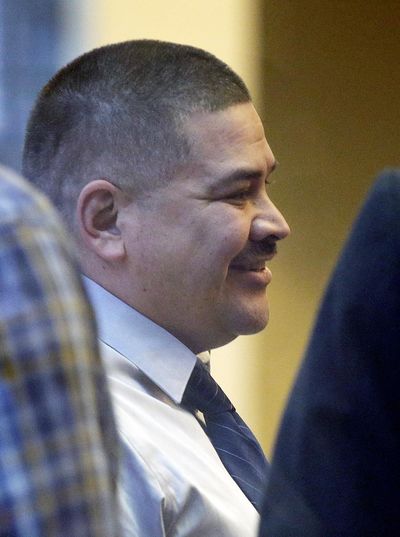Courtroom shows tribal rift as school shooter’s father is sentenced

SEATTLE – The courtroom was divided Monday along the lines that have separated an American Indian tribe since one of their own killed four high school classmates and himself with a gun he took from his father.
The families of the slain filled one side, many wiping away tears as federal prosecutors read the victims’ names aloud. Raymond Fryberg’s family and friends packed the other as he was sentenced for gun charges in a case that led to changes in the way tribal and local governments share criminal information.
U.S. District Court Judge James Robart acknowledged the rift in the room and the one that it represented for the greater Tulalip Tribe.
“I don’t know how to speak to you in Native tongue,” Robart said, “but I do know the fact that you sit on opposite sides has to end. … It’s impossible to recover from this loss, but it doesn’t mean you can’t learn to respect each other and live together.”
Fryberg apologized in a packed courtroom for his son Jaylen’s actions and said he is still grieving – not just for his son but also for the victims.
“I wake up with the same broken heart every day,” he told a standing-room-only courtroom. “Those kids are a part of my life, too.”
Fryberg was sentenced to two years in prison for illegally owning six firearms, including the gun that his 15-year-old son used in the 2014 shooting at Marysville Pilchuck High School north of Seattle.
A domestic violence protection order filed by his former girlfriend in Tulalip Tribal Court should have kept him from owning a gun. But a record of the 2002 order never made it into any state or federal criminal databases used by firearms dealers conducting background checks during gun purchases.
Prosecutors say Fryberg lied on a form when he bought the guns to hide the restraining order. His lawyers said he didn’t know he was prohibited from having firearms and argued that the process the tribal court used for filing the order was suspect.
The case helped speed the U.S. Justice Department’s work on a program that fixes some information-sharing problems between tribes and local governments. Two tribes in Washington are part of a 10-tribe pilot program launched in November.
The program allows tribes to conduct background checks and enter tribal restraining orders into federal databases, which are used by gun dealers to ensure legal sales.
Fryberg’s lawyer, John Henry Browne, said he was pleased the judge returned a shorter sentence than prosecutors requested but said he will appeal. Fryberg was allowed to go free after the hearing and has 30 to 45 days to report to prison.
U.S. Attorney Annette Hayes told reporters that prosecutors were satisfied with the ruling. “Two years is a very strong sentence,” she said.
Fryberg acquired nine firearms between November 2012 and July 2014, prosecutors say.
He bought a Beretta pistol on Jan. 11, 2013, from a gun shop on the reservation, according to a criminal complaint. He answered “no” on the federal firearms purchasing form when asked if he was the subject of a restraining order that prohibits him from “harassing, stalking or threatening your child or an intimate partner,” the complaint said.
Fryberg said he had many successful background checks that allowed him to buy guns, so he thought the protection order was “an in-house issue” that didn’t really count.
“I guess I shouldn’t have thought that because now I’m here,” he said Monday.
His son used the Beretta to kill Gia Soriano, Zoe Galasso, Shaylee Chuckulnaskit and Andrew Fryberg and seriously injure Nate Hatch on Oct. 24, 2014. Andrew Fryberg and Hatch were the shooter’s cousins.
The families of the victims filed a $110 million lawsuit Friday against Raymond Fryberg and the school district.
At Monday’s hearing, some people wore T-shirts with a photo that said: “In memory of Andrew Fryberg.” Many got emotional as Assistant U.S. Attorney Ye-Ting Woo read the names of the victims.
Woo then read a letter from Andrew Fryberg’s mother that said Raymond Fryberg “doesn’t care about the law” and his actions forced her family to leave his.
“We are broken as a family,” she said.
Fryberg said he wanted to reach out to the victims, but a no-contact order kept him away.